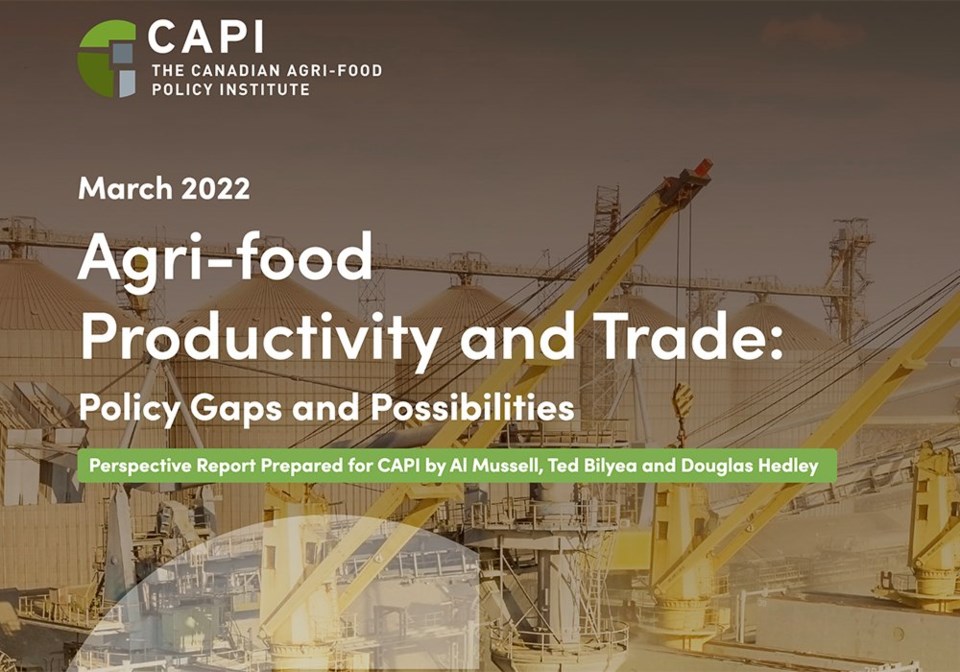WESTERN PRODUCER — Canada appears to be following an agricultural policy that fails to address three of the four central issues facing farmers, says a report presented to the Canadian Agri-Food Policy Institute.
If these omissions from federal food and agriculture policy aren’t addressed, Canadian agriculture will struggle to thrive in an increasingly protectionist world, will fail to increase agricultural production and will be unable to address the world’s growing food insecurity problems.
The federal government is focused on addressing climate change, restricting agricultural carbon emissions and facing labour issues, but “there has been limited integrative thinking regarding how we might move toward a strategy that would both mitigate climate change while decreasing the geopolitical, geoeconomics forces that are disrupting the global food trade, and the Canadian agri-food companies and industry segments engaged in it, increasing food insecurity and threatening our physical security,” says the report.
Authors Al Mussell, Ted Bilyea and Douglas Hedley highlight what they see as the failings of present policy to address the persistent problem of declining gains in agricultural productivity gains. Climate change mitigation costs are being imposed on agriculture and food production, but the inability of productivity gains to keep pace will create a weaker food production system, they warn.
If future years bring greater weather problems across the planet, as predicted, poorer nations will face a dire situation with food deficits and high food prices creating a hunger crisis.
“Recent evidence suggests that the world cannot build stocks of staples. Even with impressive yields and production, the world is going hand-to-mouth, year-to-year,” says the report.
“Even minor annual production setbacks can now have global consequences…. In summary, the current situation and reasonable outlook is one of food scarcity, broadly speaking.”
Canadian agricultural policy that seems focused solely on restrictions and limitations on carbon emissions from agriculture threatens to hamstring Canadian farm production and keep Canada from fulfilling its potential role as a greater source of food for a hungry world, Mussell, Bilyea and Hedley warn. Canada needs food production increases, not stagnation.
The situation is worsened by the precarious place of Canada’s food producers, processors and exporters in an increasingly protectionist global environment. Massive powers like the United States and China have been using trade as a political tool in their geopolitical competition, and many countries have begun employing protectionist measures to boost their trade and help their exporters at the cost of producers and companies in countries like Canada.“
As Canada is one of only a handful of net food exporters with significant capacity, we are acutely exposed to increasing geopolitical risk, which is initially unequally borne by our resource industries in the front line of this battle, especially agri-food. Moreover, we are not well organized for geoeconomic competition.”
Canada is still operating as if the rules-based international trading order is the underlying norm, but increasingly it is not. That leaves Canada’s food companies vulnerable to hostile and predatory actions by foreign competitors, including challenges to their ability to export and being subject to foreign takeovers.
The authors recommend Canada work with like-minded food exporters, as well as significant food importers to shore up “rules for trade and a shared approach to sustainability and climate mitigation.”
That might be the most effective way to mitigate the impact of countries that use trade as a geopolitical weapon as well as those that indulge in protectionism.
Not only will that help improve the lot of food exporting nations like Canada, but also those subject to hunger.
“There is little chance of improving global food security let alone dealing with the underlying risks… if we cannot lessen the geopolitical interference in the global agrifood trade.”
Mussell, Bilyea and Hedley say the Canadian government’s focus on reducing carbon emissions from agriculture needs to be married to a commitment to continuing productivity gains and a world trading environment in which Canadian exporters can thrive.
They conclude that “an emphasis on sustainability/climate change is appropriate, but not to the exclusion or weakening of agricultural productivity and the role in food security that Canada can play.”

